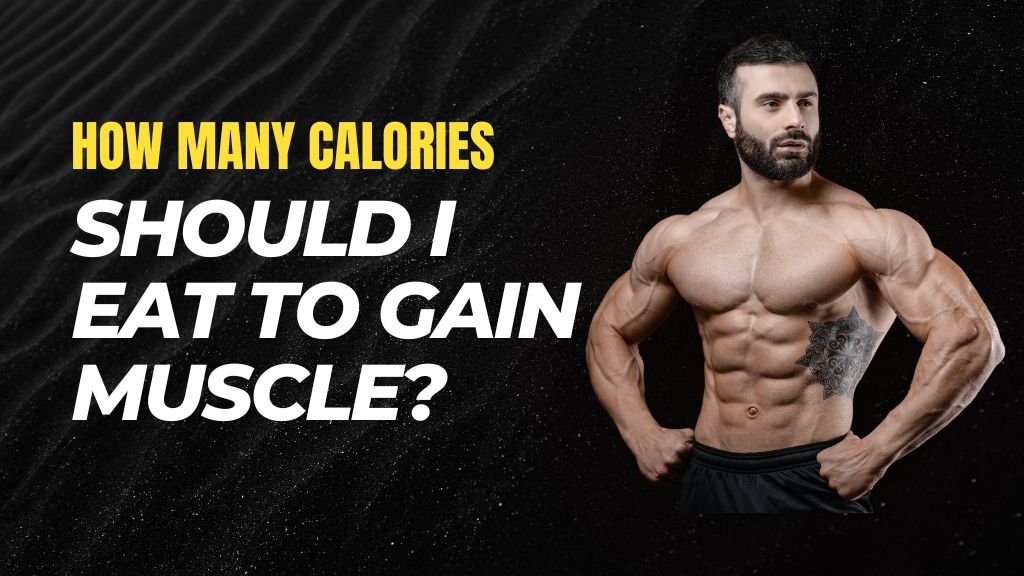How Many Calories Should I Eat to Gain Muscle?: If you are searching for the quickest approach to acquiring muscle, you must follow an eating plan tailored for weight gain. You must provide your muscles with suitable raw materials at the right moments to safely gain and maintain muscular mass.
Gaining weight may seem simple, but getting the appropriate nutrition and exercise is crucial. Additionally, gaining muscle requires eating the correct calories daily, like losing weight.
Eating more calories than your body consistently burns is the leading cause of weight gain. However, energy is needed to store energy. Put another way, during the process of breaking down food and keeping it as either muscle or body fat, your body expels calories.
On the other hand, shedding extra body fat and muscle frees up energy for utilization. This is why consuming fewer calories is a successful weight-loss strategy and why consuming more calories is necessary to gain weight.
The goal is usually to improve lean mass while reducing increases in body fat with any weight gain. This is because having muscle has several health advantages over maintaining extra fat, which is just stored energy, and since having a high body fat percentage is linked to fewer favorable health results.
How Much Calories Should I Eat To Gain Muscle (Calculator)
A lot of food suggestions focus on aiding in weight loss. Not just any weight, but specifically body fat. You can see more toned muscles underneath as you lose extra body fat. Following an exercise regimen designed to build muscle when one’s body fat percentage is lower is also simpler.
Eating fewer calories than you burn off each day is necessary for fat loss. Conversely, you must ingest more calories than you burn to grow muscle mass. After an intense training session, these extra calories aid in regenerating injured muscle tissue.
As we age, our muscles keep us robust and healthy. It is connected to the healing process following disease and damage and might help prevent diabetes and obesity. Additionally, stronger bones have been associated with strength training.
The fact that muscle has a higher metabolic rate than fat contributes to these advantageous benefits. A pound of muscle consumes between 4.5 and 7 calories daily, but a pound of fat might only burn a few. Approximately 10–20% of your daily caloric requirements come from lean tissue, whereas just 4–5% come from body fat.
Additionally, essential elements like water, amino acids, and glycogen (commonly known as carbohydrates) are stored in muscle. Because of this, having more lean tissue makes it easier to process and keep calories, and your increased weight and output enable you to consume more calories overall.
Gaining muscle allows you to eat more food and appear more fit, which many find appealing. Maintaining fat loss is also simpler if you have lean muscle mass. Because storing dietary fat as body fat uses minimal energy, one gram of stored fat equals nine calories, or 4,000 calories per pound, just as one gram of fat consumed.
On the other hand, protein and carbs take a little longer to accumulate as body fat; for every nine calories taken, only 7.35 calories are deposited, or 3,300 calories per pound. The idea that one must burn or reduce around 3,500 calories to shed one pound of fat originates from the average of these two.
Muscle protein synthesis requires much more energy to create and maintain muscle mass (MPS). Gaining one pound of lean muscle involves an excess of 2,500 to 2,800 calories. Naturally, this figure depends significantly on personal aspects, including genetics, total nutrition, initial body composition, and training intensity.
Is It Possible to Lose Fat and Gain Muscle at the Same Time?
If strength exercise and a higher protein intake are included, your body can still be in a calorie deficit and gain muscle at higher body fat levels. This is a result of your body using fat reserves as fuel. Naturally, doing this takes time and effort compared to concentrating on fat loss or muscle building. There are better strategies for everyone, too.
How to Determine Your Lean Body Mass?

Building muscle mass is dependent primarily on one’s body composition. The amount of muscle you can make overall, how shredded and lean you look at the end, and your optimum bulking diet can all be influenced by your initial body fat percentage.
Determining how much muscle mass you’ve acquired relative to fat requires calculating your percent body fat.
Several methods for calculating your body composition, some of which are more precise than others. Whichever way you decide, you should apply the same methodology to gauge your development. Although they are quick, cheap, and don’t need professional help, handheld scales and readings at home have a considerable margin of error.
Many businesses provide more precise measurements, such as underwater weighing and DXA scans, by appointment for a more accurate approach. These can be a little more expensive but offer much more precise and thorough readings. DXA scans can even give you a detailed picture of your body’s muscle and fat storage locations.
How Many Calories To Gain Muscle, But Not Fat?
If your goal is to develop muscle, stay away from blunders that could end up gaining weight instead. This is particularly true concerning your calorie intake; therefore, you must consider getting the proper quantity.
A pound of muscle is gained by burning approximately 2,800 calories, primarily for maintaining protein turnover, which can be increased by physical training. Only roughly 227 grams of muscle can be added to your body weekly. However, you will also gain fat if you overeat to grow muscle.
An additional 250 to 500 calories should be consumed each day. Keep yourself on the lower end of the range if you gain weight quickly. Aim for the upper end if you generally struggle with weight gain.
Furthermore, there’s a lot of anxiety about the amount of protein! A study found that consuming lean protein 15 to 20 minutes before, during, and immediately following exercise will help you gain muscle.
But protein isn’t the only thing to think about. It’s about incorporating a range of meals into a healthy, well-balanced diet that will help you grow muscle, burn fat, and increase your strength to satisfy your calorie needs and get the nourishment you need.
1. A wholesome morning meal
Consume breakfast to aid muscle mass growth because it gives you an immediate energy boost.
2. Consume food every three hours
You will lose weight more quickly if you eat smaller meals more often than a few larger ones. Your waist will get smaller, and you’ll feel fuller faster.
3. Add some protein
To gain muscle growth, incorporate protein into each meal. It would be advantageous since protein aids in developing and maintaining muscle mass. Aim to eat at least 1 gram of protein for every 454 grams of body weight to accomplish this. A person weighing 91 kg would consume 200 g daily. The simplest way to get this amount is to eat a whole protein source with every meal.”
4. Fruits and vegetables
Every meal should include fruit and vegetables because most of them, though not all of them, are low in calories and let you fill your stomach without gaining weight or becoming obese. Fruits and vegetables contain vitamins, minerals, fiber, antioxidants, and other nutrients that help digestion.
5. Consume carbohydrates
Eat carbohydrates as soon as your workout is over. Although we need carbohydrates for energy, most individuals eat significantly more than they need. It would be best if you only ate carbohydrates after working out.
Eat fruit and vegetables with every meal, excluding corn, carrots, and raisins, as they are lower in carbohydrates than whole grains. This covers a variety of foods, such as quinoa, oats, potatoes, bread, pasta, and rice. Consume whole grains rather than white carbohydrates; save the carbs after your activity.
6. Consume good fats
Healthy fats aid in weight loss and fitness maintenance since they digest more slowly. Eat various beneficial fats with every meal, and avoid margarine and artificial trans fats.
7. Take in adequate water
If you want to gain more muscle mass, drink water! Sweating from strength training encourages the loss of water. This keeps you from acquiring muscle mass and helps to slow down the repair of your muscles. Since an empty stomach might cause you to feel hungry, drinking water prevents dehydration and decreases hunger.
8. Consume whole foods
Ninety percent of the calories you consume must come from whole meals to get the required outcomes and dramatically improve your muscle mass.
Also Read
- Are Prawns Healthy To Eat
- Parboiled Rice Is Good For Diabetes
- How Many Gallons of Water Should i Drink a Day
- Are Plantain Chips Healthy For You
- Parboiled Rice Is Good For Diabetes
- How Many Push-ups Should I Do In a Day?
Conclusion (How Many Calories Should I Eat to Gain Muscle?)
Measure your weight and body fat each month. Most importantly, perform strength training activities regularly. If you gain a little fat, gradually decrease your daily calorie consumption; if you don’t build muscle mass, raise your daily calorie intake progressively.
Frequently Asked Questions
1. Can one grow muscle without gaining weight?
Body recomposition is the process of simultaneously gaining muscle and losing fat. Thus, you’ll earn less fat and be able to keep a “toned” appearance if you take your time developing strength.
2. If I gain muscle, can I consume more calories?
For many people, increasing their daily caloric intake by 5 to 10% is adequate to encourage lean muscle growth. You can eat an additional 250 calories a day if, for instance, your daily calorie requirements are 2500. However, depending on beginning body composition and degree of exercise, there could be some variations in each person’s calorie requirements.
3. Why am I still obese yet gaining muscle?
You may be ingesting more calories than you know. Inadequate cardiovascular exercise: Prioritizing strength training over cardio exercise can increase muscle without appreciable fat reduction.




